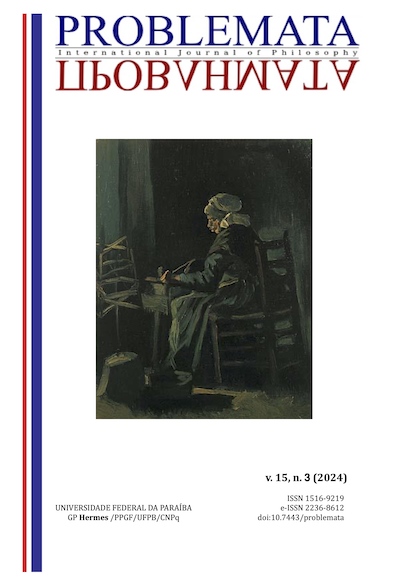CITIZEN WITHOUT QUALITIES:
FALSE FREEDOM IN RAWLS' LIBERALISM
DOI:
https://doi.org/10.7443/problemata.v15i3.70318Keywords:
Political philosophy, Theorie of justice, Rawls, Citizenship, CriticismAbstract
The objective of this article is to propose a reinterpretation of the conception of citizenship present in Rawls' theory of justice. We will carry out this study, mobilizing the analytical categories of the critical theory of society, with which we will identify, on the one hand, the strength of Rawls' theory of justice and, on the other, its fragility in the face of the administrative State. Through the dialectical method, we will show that the categorical parameters of Rawls' Theory of Justice oscillate between the idea of popular sovereignty and the abstract concept of citizen. As a result of this investigation, we concluded that the Rawlsian citizen is easily subjected and neutralized by the authoritarian tendency of the administrative State, to the detriment of the constitutional State. Therefore, social liberalism cannot support a strong concept of freedom, which is consistent with the collective exercise of public freedoms and with the idea of popular sovereignty, since this is incompatible with the individualist or atomist conception of citizenship.
Downloads
References
ADORNO, T. W. Théorie esthétique (1970), Paris, Klincksieck, 1995.
ARENDT, H. La crise de la culture, Paris, Gallimard, 1972.
ARENDT, H.. A vida do espírito, Rio de Janeiro, Relume Dumará, 2000.
ARISTOTE, La politique, Paris, J. Vrin, 1970.
AUDARD, C., Qu’est-ce que libéralisme: Éthique, politique, société, Paris, Gallimard, 2009.
COHEN, J., «Reflections on Habermas on Democracy», Ratio Juris, vol. 12. nº 4, 1999, p. 385-416.
DWORKIN, R., «The Original Position», in N. Daniels (dir.), Reading Rawls, Stanford, Stanford University Press, 1989, p. 16-53.
FOISNEAU, L., Governo e Soberania: o pensamento político moderno de Maquiavel a Rousseau, Porto Alegre, Linus, 2009.
FOUCAULT, M., Il faut défendre la société, Paris, Gallimard, 1997.
FORST, R., Justification and Critique, Cambridge, Polity Press, 2014.
HABERMAS, J.; RAWLS, J., Débat sur la justice politique, Paris, Les Éditions du Cerf, 1997.
HEGEL, F. Préface et Introduction de la Phénoménologie de l’esprit (1807), Édition bilingue, Paris, J. Vrin, 1997.
HEGEL, F.. Principes de la philosophie du droit (1820), Paris, Gallimard, 1989.
HEGEL, F.. La raison dans l’Histoire (1822, 1828, 1830), Paris, 10/18, 2000.
KOHLBERG, L., «From is to ought», in T. Mischel (dir.), Cognitive development and epistemology, New York: Academic Press, 1971, p. 151-236.
RAWLS, J. Théorie de la justice, Paris, Ed. du Seuil, 1997.
RAWLS, J.. La justice comme équité, Paris, La découverte, 2008.
RAWLS, J.. «The Sense of Justice», The Philosophical Review, vol. 72, nº 3, 1963, p. 281-305.
RAWLS, J.. «Two Concepts of rules», Philosophical Review, vol. 64, nº 1, 1955, p. 3-32.
SIMMONS, A. John, «Ideal and Nonideal Theory», Philosophy & Public Affairs, vol. 38, nº 1, 2010, p. 5-36.
STARK, C. A., «Hypothetical Consent and Justification», The Journal of Philosophy, vol. 97, n° 6, 2000, p. 313-334.
TOCQUEVILLE, A., De la démocratie en Amérique [1835, 1840], Oeuvres complètes, vol. II, Paris, Gallimard, 1992.
WIGGINS, D., «Neo-Aristotelian Reflections on Justice», Mind, New Series, vol. 113, nº 451, 2004, p. 477-512.
Downloads
Published
Issue
Section
License
Copyright (c) 2024 Luís Sérgio De Oliveira Lopes

This work is licensed under a Creative Commons Attribution 4.0 International License.
Authors who publish with this journal agree to the following terms:
- Authors retain copyright and grant the journal right of first publication with the work simultaneously licensed under a Creative Commons Attribution License that allows others to share the work with an acknowledgement of the work's authorship and initial publication in this journal.
- Authors are able to enter into separate, additional contractual arrangements for the non-exclusive distribution of the journal's published version of the work (e.g., post it to an institutional repository or publish it in a book), with an acknowledgement of its initial publication in this journal.
-
- Authors are permitted and encouraged to post their work online (e.g., in institutional repositories or on their website) prior to and during the submission process, as it can lead to productive exchanges, as well as earlier and greater citation of published work (See The Effect of Open Access).





